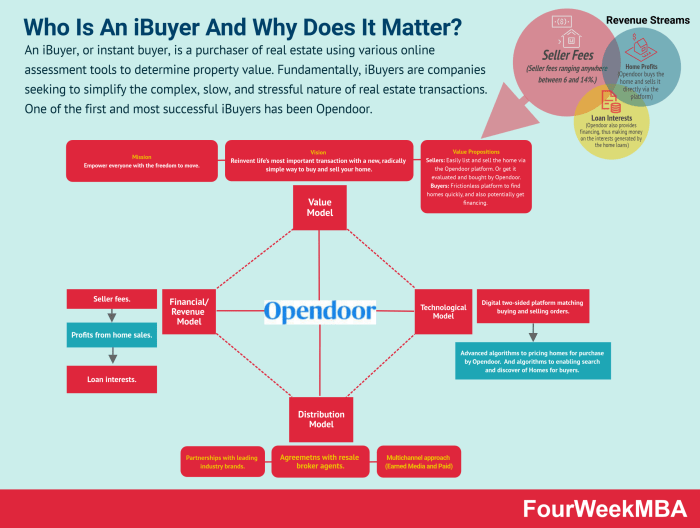Exploring the World of iBuyers: A Comprehensive Guide
Delving into the realm of iBuyers, this introductory paragraph aims to intrigue and inform readers about this innovative approach in the real estate market.
As we navigate through the details, we will uncover the essence of iBuyers and shed light on their impact on traditional real estate transactions.
What is an iBuyer?
An iBuyer, short for instant buyer, is a type of real estate company that uses technology to make quick offers on homes and purchase them directly from sellers. These companies aim to streamline the home selling process by providing sellers with fast and convenient transactions.
Examples of iBuyer Companies
- Opendoor: Opendoor is one of the most well-known iBuyer companies in the real estate market. They operate in multiple cities across the United States and offer sellers a hassle-free selling experience.
- Zillow Offers: Zillow Offers is another prominent iBuyer platform that allows homeowners to sell their properties quickly without the need for traditional listing and showings.
- Offerpad: Offerpad is a direct home buying company that provides sellers with competitive cash offers and flexible closing timelines.
Differences from Traditional Real Estate Transactions
- Speed: iBuyers can make offers on homes within days, allowing sellers to close the deal quickly compared to traditional methods that may take weeks or months.
- Convenience: iBuyers eliminate the need for sellers to prepare their homes for showings and deal with the uncertainties of the traditional selling process.
- Transparency: iBuyers provide sellers with clear offers and fees upfront, reducing the chances of negotiations and unexpected costs during the transaction.
Pros and Cons of iBuyers
When considering selling a home, it's essential to weigh the advantages and disadvantages of working with iBuyers, who offer a convenient alternative to traditional real estate transactions.
Advantages of Selling to an iBuyer
- Speedy Transactions: iBuyers can provide a quick sale, often closing within a matter of days compared to the weeks or months it may take with traditional methods.
- Convenience: iBuyers typically handle all the paperwork and logistics, simplifying the selling process for homeowners.
- No Repairs Needed: iBuyers usually purchase homes in their current condition, saving sellers the time and money required for repairs or renovations.
- Predictable Sale Price: iBuyers offer a transparent pricing model, providing sellers with a clear understanding of the amount they will receive for their home.
Potential Drawbacks of Using an iBuyer Service
- Lower Sale Price: iBuyers may offer a lower price compared to listing a home on the market, as they factor in the costs of repairs, holding, and resale.
- Fees and Commissions: iBuyers charge service fees and commissions, which can reduce the final proceeds that sellers receive from the sale.
- Limited Market Reach: Selling to an iBuyer may limit exposure to potential buyers, resulting in a potentially lower selling price compared to a competitive market.
- Lack of Negotiation: iBuyers typically provide a take-it-or-leave-it offer, limiting the opportunity for sellers to negotiate on the sale price.
Comparison of Transaction Speed
When it comes to the speed of transactions, iBuyers have a clear advantage over traditional methods. While selling a home through a real estate agent can take weeks or even months, iBuyers can often close a sale in a matter of days.
This quick turnaround can be beneficial for sellers who are looking for a fast and hassle-free selling experience.
How iBuyers Determine Home Value

When it comes to determining the value of a property, iBuyers utilize various methods and technologies to arrive at an offer price.
Methods Used by iBuyers
- iBuyers use automated valuation models (AVMs) that rely on algorithms and data analysis to estimate a home's value based on factors such as location, size, age, and recent sales data.
- Some iBuyers also conduct in-person inspections or virtual assessments to assess the condition of the property and make adjustments to their initial valuation.
Role of Technology and Data Analysis
- Technology plays a crucial role in enabling iBuyers to process vast amounts of data quickly and accurately, allowing them to make informed decisions about property values.
- Data analysis helps iBuyers identify trends in the real estate market and adjust their pricing strategies accordingly to stay competitive.
Factors Impacting Offer Price
- Market conditions, such as supply and demand, can influence the offer price from an iBuyer, as they aim to make competitive offers while ensuring profitability.
- The condition of the property, including any needed repairs or renovations, can also affect the final offer price as iBuyers factor in these costs.
- Location, neighborhood trends, and recent comparable sales are essential considerations that iBuyers take into account when determining the value of a property.
iBuyer Process Explained

Selling to an iBuyer involves a streamlined process that differs from the traditional real estate route. Here is an overview of how the iBuyer process typically works:
Step-by-Step Overview
- Seller submits information about their home online to the iBuyer.
- The iBuyer evaluates the property and provides a cash offer within a few days.
- If the seller accepts the offer, a home inspection is scheduled.
- Repairs or credits are negotiated based on the inspection report.
- The closing date is set, and the seller can choose a convenient timeline.
Expectations During Inspection and Closing
- During the inspection, the iBuyer will assess the condition of the property to determine any necessary repairs.
- Sellers can expect a faster closing process compared to traditional sales, typically within a few weeks.
- The closing is often done virtually or at a location of the seller's choice for convenience.
Differences in Timelines
- iBuyers offer quicker transactions, with closings usually taking place in a matter of days to weeks.
- Traditional home sales can take months to complete due to various factors like financing contingencies and negotiations.
- Sellers benefit from a more predictable timeline with iBuyers, avoiding uncertainties and delays in the selling process.
Final Thoughts
Concluding our exploration of iBuyers, we have unveiled the advantages, drawbacks, and intricacies of this modern method of buying and selling homes.
FAQ Insights
How do iBuyers determine home value?
iBuyers utilize advanced algorithms and data analysis to assess a property's value swiftly and accurately.
What are the advantages of selling to an iBuyer?
Quick transactions, cash offers, and minimal hassle are some key benefits of selling to iBuyers.
Do iBuyers follow the same timeline as traditional home sales?
iBuyer transactions generally move faster than traditional sales, offering a quicker closing process.